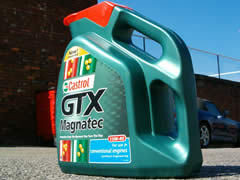How is Engine Oil Made and What It Is Made Of - Vol.293
Engine oil, or motor oil, is a lubricating fluid used to reduce wear on moving parts of an internal combustion engine. In addition to providing lubrication, most modern engine oils also perform cleaning functions and cool the engines by diverting heat away from the moving parts of an engine.
While studying crude oil back in the 19th century, John Ellis was interested in its medical applications. He was not able to come up with any. What he did discover during his studies of oil was that crude oil could serve as a lubricant at high temperatures much better than animal or vegetable fats used as lubricants back then. Ellis' invention propelled the use of steam power all over the world. It provided steam engines with a much longer lifespan due to significantly lower wear and tear of engines thanks to great oil-based lubrication.

Here is how conventional oil is made: first, crude oil is derived from the Earth using oil wells. Then it is distilled into many different liquids, each having its own distinct features.
Some of these liquids, such as gasoline or kerosene, are very light, burn well and are used as fuel.
Others are much heavier and are used as a base in lubricants. The American Petroleum Institute divides these base oils into five groups.
Groups I through III include base oils refined from petroleum crude oil.
Group IV oils are full synthetic.
Group V is for oils that do not fit into any other category.
Base oils with no additives would not perform well in a real-car engine. This is why the oil is modified to add desired properties to it. Here are the most important ones:
The Oil Needs to Work Well in Different Temperatures
It needs to flow well when a car is being started in extreme cold, so that metal pieces inside of engine do not scratch each other. It also needs to work as a lubricant when an engine is performing at its peak.
Base oils act differently at different temperatures. One of the most important criterions of motor oil performance is viscosity. It is a measure of a fluid under stress. As temperatures drop, the molecules of oil start sticking together and the viscosity increases. When temperatures go high, the opposite happens, viscosity decreases and the oil stops going a good enough job of protecting an engine.
This is why compounds known as viscosity improvers are added to base oil. Viscosity improvers change the natural viscosity of base oils. They consist of molecules that shorten when temperature drops and lengthen when temperature increases. Unfortunately, these improvers do not last very long, which is why regular engine oil needs to be changed every 3000 miles.
Engine Oil Needs to Have a High Flash Point
Flash point is the lowest temperature at which the oil produces vapors that can ignite, but not continue to burn when mixed with air.Vapors igniting at low temperatures are very dangerous, which is whymanufacturers of engine oils strive to achieve high flash points. Synthetic oils have much higher flash points than conventional oils.
Engine Oil Needs to Have a High TBN
TBN is short for Total Base Number. This number measures oil's alkalinity. Alkalinity is important because the combustion process in an engine creates acids that over time damage and wear metals and other engine parts. TBN is highest when oil hasn't been used. As oil is used, TBN decreases and oil reaches a point where it can't absorb any more acids. TBN is measured in milligrams of Potassium Hydroxide per gram (mg KOH/g). The majority of regular engine oils have a TBN between 7 and 10. TBN for diesel engines ranges between 10 and 15 because diesel engines produce more acids.